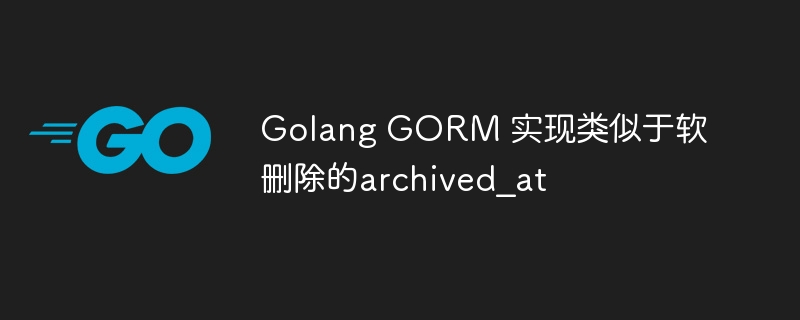Maison >développement back-end >Golang >Golang GORM implémente archived_at similaire à la suppression logicielle
Golang GORM implémente archived_at similaire à la suppression logicielle
- WBOYWBOYWBOYWBOYWBOYWBOYWBOYWBOYWBOYWBOYWBOYWBOYWBavant
- 2024-02-05 22:33:12553parcourir

J'utilise GORM V1. J'ai une exigence, nous voulons ajouter un deleted_at 的 archived_at 列。实体可以存档和取消存档,默认情况下我们希望使用 archived_at de type GORM pour NULL pour interroger les enregistrements.
Mon idée actuelle est d'utiliser les rappels GORM pour enregistrer les rappels
- Enregistrez le rappel avant gorm:query callback.
- Vérifiez si le schéma/modèle nécessite le champ archived_at.
- Si le champ existe, veuillez ajouter les conditions nécessaires.
Cela semble bien, mais comment copier efficacement l'équivalent du Unscoped() de l'archive.
- Quelle est la manière idiomatique d'obtenir des enregistrements archivés ? Comment indiquer si une colonne
archived_atdoit être ajoutée au rappel nécessaire ? - Je me retrouve également dans une situation où je souhaite simplement obtenir des enregistrements archivés (où
archived_atN'EST PAS NULL).
EDIT - Mon cas d'utilisation consiste à utiliser à la fois les champs deleted_at et deleted_at 和 archived_at, plutôt que d'utiliser un champ à la place de l'autre. Je souhaite conserver la possibilité de suppression logicielle tout en ajoutant la possibilité d'archiver des entités. L'utilisateur peut simplement être archivé puis éventuellement supprimé (soft delete).
Réponse correcte
Inviter des commentaires. C'est ce à quoi je pense en ce moment.
callback.go
package db
import (
"fmt"
"reflect"
"gorm.io/gorm"
)
const (
gormsettingkeyunscopearchive = "unscope_archive"
structfieldnamearchivedat = "archivedat"
)
// archivedquerycallback - conditionally adds "where archived_at is null" if the model being queried has the following
// 1. struct field represented by structfieldnamearchivedat
// 2. gorm instance setting gormsettingkeyunscopearchive, see unscopearchive
func archivedquerycallback(db *gorm.db) {
// check if model is a pointer and has an indirect struct type
if db.statement.model != nil &&
reflect.typeof(db.statement.model).kind() == reflect.ptr &&
reflect.indirect(reflect.valueof(db.statement.model)).kind() == reflect.struct {
stmt := &gorm.statement{db: db}
parseerr := stmt.parse(db.statement.model)
if parseerr != nil {
panic(parseerr)
}
if _, archivedatexists := stmt.schema.fieldsbyname[structfieldnamearchivedat]; archivedatexists {
v, ok := db.instanceget(gormsettingkeyunscopearchive)
if ok {
if v == true {
return
}
}
db.where(fmt.sprintf("%s is null", stmt.schema.fieldsbyname[structfieldnamearchivedat].dbname))
}
}
}
scope.go
// unscopearchive - sets a true value for the key gormsettingkeyunscopearchive
func unscopearchive(db *gorm.db) *gorm.db {
db = db.instanceset(gormsettingkeyunscopearchive, true)
return db
}
main.go
type User {
ID string `gorm:"primary_key" json:"id" valid:"uuidv4, optional"`
CreatedAt time.Time `valid:"-" json:"created_at"`
UpdatedAt time.Time `valid:"-" json:"-"`
DeletedAt gorm.DeletedAt `sql:"index" valid:"-" json:"-"`
ArchivedAt time.Time
}
var user []User
ctx := context.Background()
dbClient := InitializeGORM() //helper
_ := dbClient.WithContext(ctx).Find(&user).Error // SELECT * FROM users WHERE deleted_at IS NULL AND archived_at IS NULL;
_ := dbClient.WithContext(ctx).Scopes(UnscopeArchive).Find(&user).Error // SELECT * FROM users WHERE deleted_at IS NULL;
Ce qui précède est le contenu détaillé de. pour plus d'informations, suivez d'autres articles connexes sur le site Web de PHP en chinois!

